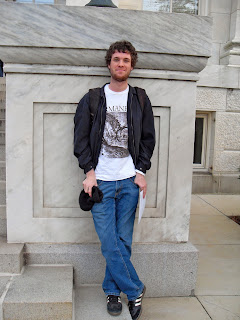

By Adam Shachat, and Billy Stanton
Changes are coming in the American University tunnel. While one favorite is leaving, a new restaurant’s grand opening is right around the corner. Asian Flavors, an Asian and Chinese style restaurant will be moving into the vacant space next to the UPS store and is bracing for it’s anticipated opening next month. Asian Flavors will serve an array of Asian food such as Thai, Mongolian and Chinese food.
According to Dan Courter, the Director of Auxiliary Services at American University, Tom Gera owner of the lease on Asian Flavors, the restaurant will definitely be open after Christmas break, but there are hopes it will be open sometime during the break and will cater to staff and those who will be around campus during the holiday season. Although there is no set date for the opening, January seems to be month Courter and Gera are aiming for. On November 23, there was a meeting between Gera, Courter, and several others including student representatives to figure out what the last steps were before the opening was ready.
Construction for Asian Flavors is all set and most of the kitchen supplies have been delivered already. According the Courter the kitchen is already set up and ready to start, all that remains is a final inspection in order to receive their food license. After that, the kitchen staff will be allowed to turn on the gas and start cooking. Right now the windows looking into the restaurant are painted black, but Courter claims the paint will be removed December 10th.
Asian Flavors was settled on by Courter and a group of people including student representatives who settled on an Asian style restaurant. The group of students helped pick a type of food that is not readily available already on campus. They also used a few surveys in which Asian food came out as the food that students wanted most. Although there is already one common complaint about the decision from a few students “We don’t have many options on the weekends if we want to use meal swipes” said junior Chris Cole. “We have three places on campus that take meal swipes but there are times during the weekend when TDR, The Tavern and Boxed Lunch are closed. Other times TDR is the only place that’s open. We should more options to use our meal swipes.” Meal swipes are worth one meal at participating restaurants on campus, which differ from Eagle Bucks which is a limited dollar amount that can be redeemed at certain places on or around campus. In addition, many students on campus have a full meal plan and can’t afford to pay for food otherwise. “ It makes no sense that I bought the full meal plan and on the weekends, and have so few options to use it,” said freshmen Michael Gardner.
However, while one restaurant is planning its unveiling, another is plotting its exit strategy. There are talks of the McDonalds closing a few doors down from the soon to be Asian Flavors. However it is unlikely its replacement will take meal swipes. McDonalds has been a popular spot for fast food on campus for about ten years now, but its lease will be up at the end of 2011 and as of now it will not be renewed according to Courter. While some students are very excited about the arrival of Asian Flavors, certain students are upset about McDonalds leaving the campus of Au. “ It was a place I could get my food quickly and it was cheap and good,” said sophomore Michael Mullen.
December 31 marks the final day that this particular restaurant will be serving such popular items as the McChicken, the Big Mac, and the McDouble. According to Courter, “They will be serving food right up until the last minute of their lease. They are not going to pull out on us.”
The McDonalds on campus just recently added to the number of hours it is open during the week, making Friday and Saturday open around the clock for 24 hour service. However it seems that the franchise owner simply did not see it as a strong enough location to renew its lease. The employees don’t know much about the lease or if they will renew. The store manager Anthony Johnson would like this particular location to remain a McDonalds for as long as possible. ““McDonalds has been here longer than I have, about 10 years I heard them say. We hope to stay here a lot longer” said Anthony. It is unclear what they employees will do when the lease is up.
In terms of what will be picked to replace it, the search has already been started. Courter has already been in communication with many of the big franchises in fast food. “We are going to cast a pretty broad net to see who is interested” said Courter. “Whoever fits the best and has the resources to make it happen will pick up the lease.”
A dinning service program has already been assembled that includes student representation to discuss options and find out what would be the most popular choice for students and faculty. They are conducting more surveys and listening to opinions on the matter. One popular idea is for a place that will accept meal swipes, although that will be unlikely if a large franchise picks up the lease.
Its very interesting because schools neighboring us such as George Washington, Georgetown, and Maryland don’t seem to have this problem infect, they have to many chooses to choose from. “ It’s a little intimidating with all the food selections we have to choose from here but, I definitely can’t complain,” said Junior Garry Devine at Georgetown and a former American University student.
Although the school is losing one popular eatery, it will shortly be gaining a new one a few doors down. Out with the old and in with the new.






